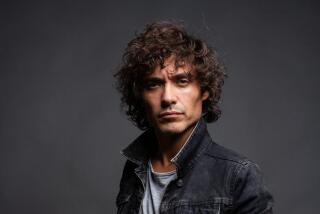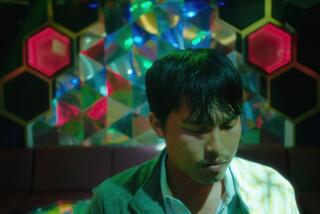Javier Bardem looks for what drives the villain
Javier Bardem got his start in cinema as an extra, initially working on films only to support his painting career. The Spanish actor, now 48, studied art for several years before getting his big break in 1992’s “Jamón, Jamón,” in which Bardem played a bullfighter. He transitioned to English-language films with “Before Night Falls,” a project that landed him an Oscar nomination and, since then, the actor has been an integral part of Hollywood. He’s embodied a Bond villain, a dying father and a love interest for Julia Roberts. His latest role is that of Captain Salazar, a man bent on revenge in Disney’s fifth “Pirates” film, “Pirates of the Caribbean: Dead Men Tell No Tales,” out May 26.
“I’ve been doing this for 25 years now and in the end it’s always the same reason why I do it,” Bardem says. “It’s about the story. What story are you going to tell? What is the echo that story’s bringing with it? Does it have something worth talking about? And within that, what is your role? At the end of the day it’s about telling something that’s worthwhile. And that can be ‘Pirates of the Caribbean.’ It doesn’t need to be profound or deep. It can be fun.”
It’s not about being a villain — it’s about trying to see what’s behind the monster.
— Javier Bardem
Bardem, who is married to fellow Spanish actor Penélope Cruz, was particularly interested in the villainous aspect of Captain Salazar because it felt like a new opportunity for him. “It’s not about being a villain — it’s about trying to see what’s behind the monster. What made him become a monster? In ‘Pirates,’ it’s all about pain and it’s all about revenge. Although, of course, you know you’re doing a Disney movie, so you have to lighten it up.”
Later this year, Bardem will star opposite Jennifer Lawrence in Darren Aronofsky’s “Mother!,” a film the actor says he can’t describe because he legitimately has no idea what it’s about, and “Escobar.” The latter is particularly important for Bardem because he’s been hoping to play Pablo Escobar for nearly two decades. “I’ve been offered many Escobars and I’ve refused them all because I always found them very one-colored,” the actor says. “Finally, I have the chance to have a good script and a great director and we made it.”
Here Bardem discusses some of his most important films, including his work with Woody Allen and his Oscar-winning role in “No Country for Old Men.”
“Pirates of the Caribbean: Dead Men Tell No Tales,” Captain Salazar (2017)
“Beyond a good paycheck — which is important to keep doing other kinds of movies — when entering into a movie like this you know you are going to be surrounded by top-notch crew members and cast who expect to create something fantastic. And on top of that I knew it was going to be very fun. There are not many opportunities to make a movie that is this fun. They dress you like a pirate, they give you a sword and you come into a genre you’ve adored since you were a kid. It’s great to do something you’ve been enjoying for so long since you were young.”
“Skyfall,” Silva (2012)
“I grew up watching James Bond movies and I was lost in them — what a world! When Barbara Broccoli and Sam Mendes approached me they were bringing a very open mind to create a character with me. We all thought that it could be fun to bring more than a dangerous or threatening character. We wanted somebody who would create uncomfortable situations for Bond and everybody around him. You cannot read him. You do not know what he’s going to do next. That was the fun part of it.”
“Biutiful,” Uxbal (2010)
“[Alejandro Iñárritu is a genius. I remember calling him after I saw ‘21 Grams.’ I was shocked by that movie and I said, ‘I would love to work with you.’ The chance came and when I read the script it felt like a huge mountain he was asking me to climb. That was the first time he put all the weight of a movie in one character. We both were aware that the emotional weight was huge. That mountain was high and it was rocky. But we both are warriors and we fought together to get there. It was tough, but I’m very proud of that movie.”
“Vicky Cristina Barcelona,” Juan Antonio (2008)
“I think I talked to Woody Allen like three times during the whole shoot. One day he was on set and he said to me, ‘Oh, Javier, how are you?’ He said hi to me like he was surprised I was on set! He doesn’t really talk much to actors. It was a huge challenge because I was doing all these long scenes in a foreign language with fast dialogue in one take. It took me a while to get used to that, but once I got used to that I loved it because it’s like theater. There’s no time to waste. You have to really be alert. You are so alive. And, of course, it’s a very important movie of mine because I met my wife there.”
“No Country for Old Men,” Anton Chigurh (2007)
“The challenge was to really create a character with no background, a character that is not human. He’s a symbol of the horrible, violent fate that will come to you if you cross his path. That was a real challenge – to create someone who is so removed from empathy or even personal desire that he’s unstoppable.”
“Before Night Falls,” Reinaldo Arenas (2000)
“[Director] Julian Schnabel and I met at a party when I was visiting New York for the first time in my life. He approached me and he knew I was an actor from Spain and he said he had this project. I was like, ‘Yeah, right.’ But months after, he called me and he gave me the script. I was going to play Lazaro and some other actor was going to play Reinaldo, but something changed and Julian offered me Reinaldo. I refused. I said, ‘I don’t speak English.’ I spoke very, very poor English. But you can’t say no to Julian. He followed me to the end of the Earth until I said I’d do it. And thank God he was that persistent because it was a game-changer for me. It was very challenging and very creative. I owe him so much.”
“Jamón, Jamón,” Raul (1992)
“The director, Bigas Luna, gave me the first big role of my life and a career and a motive to keep working. If that experience would have been hard or tough or if the director would have been tougher or less respectful, I don’t think I would have been an actor. But because it was the opposite and it was so fun I decided that’s what I wanted to make for a living. Bigas died recently and I was devastated by it and I produced a documentary about him as an homage.”
“The Ages of Lulu,” Jimmy (1990)
“It was my very first movie and I had this small role. Before that I had just worked as an extra in movies. The director gave me two or three lines. I was this male prostitute. I wore long socks and I was naked and I was having sex with men, women, animals – almost everything. My mom, who is an actress, was the boss of the whorehouse. I just went for it.”
See the most read stories this hour »
More to Read
Only good movies
Get the Indie Focus newsletter, Mark Olsen's weekly guide to the world of cinema.
You may occasionally receive promotional content from the Los Angeles Times.






